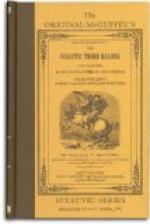4. “It is almost night,” the mother
said,
“And time for my boy to be
in bed;
When you wake up and it’s
day again,
It will be to-morrow, my darling,
then.”
5. The little boy slept through all the night,
But woke with the first red streak
of light;
He pressed a kiss to his mother’s
brow,
And whispered, “Is it to-morrow
now?”
6. “No, little Eddie, this is to-day:
To-morrow is always one night away.”
He pondered a while, but joys came
fast,
And this vexing question quickly
passed.
7. But it came again with the shades of night;
“Will it be to-morrow when
it is light?”
From years to come he seemed care
to borrow,
He tried so hard to catch to-morrow.
8. “You can not catch it, my little Ted;
Enjoy to-day,” the mother
said;
“Some wait for to-morrow through
many a year
It is always coming, but never is
here.”
Definitions.—1. House’hold, family, those living in the same house. 2. Elf, a small fairy-like person. Vex, worry, trouble. Pon’dered, thought anxiously. A-while’, for a short time.
Exercises.—What is meant by “dancing eyes” in the second stanza? What is meant by “the shades of night,” in the seventh stanza? Of what name are “Eddie” and “Ted” nicknames? What troubled Eddie? Can you define tomorrow? What did Eddie’s mother advise him to do?
XII. WHERE THERE IS A WILL THERE IS A WAY. (47)
1. Henry Bond was about ten years old when his father died. His mother found it difficult to provide for the support of a large family, thus left entirely in her care. By good management, however, she contrived to do so, and also to send Henry, the oldest, to school, and to supply him, for the most part, with such books as he needed.
2. At one time, however, Henry wanted a grammar, in order to join a class in that study, and his mother could not furnish him with the money to buy it. He was very much troubled about it, and went to bed with a heavy heart, thinking what could be done.
3. On waking in the morning, he found that a deep snow had fallen, and the cold wind was blowing furiously. “Ah,” said he, “it is an ill wind that blows nobody good.”
4. He rose, ran to the house of a neighbor, and offered his service to clear a path around his premises. The offer was accepted. Having completed this work, and received his pay, he went to another place for the same purpose, and then to another, until he had earned enough to buy a grammar.
5. When school commenced, Henry was in his seat, the happiest boy there, ready to begin the lesson in his new book.
6. From that time, Henry, was always the first in all his classes. He knew no such word as fail, but always succeeded in all he attempted. Having the will, he always found the way.




